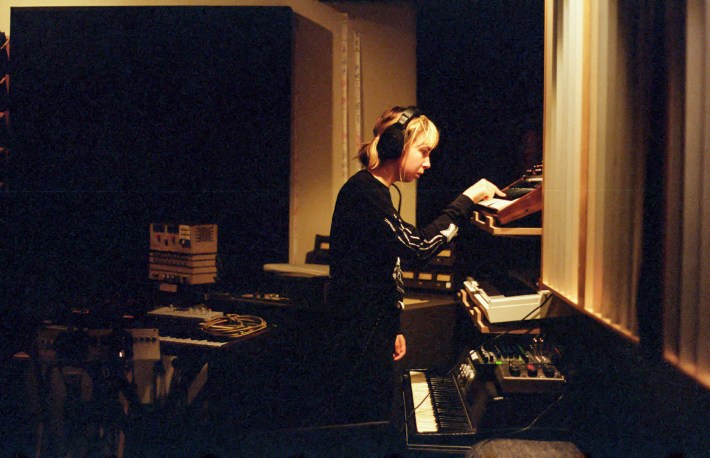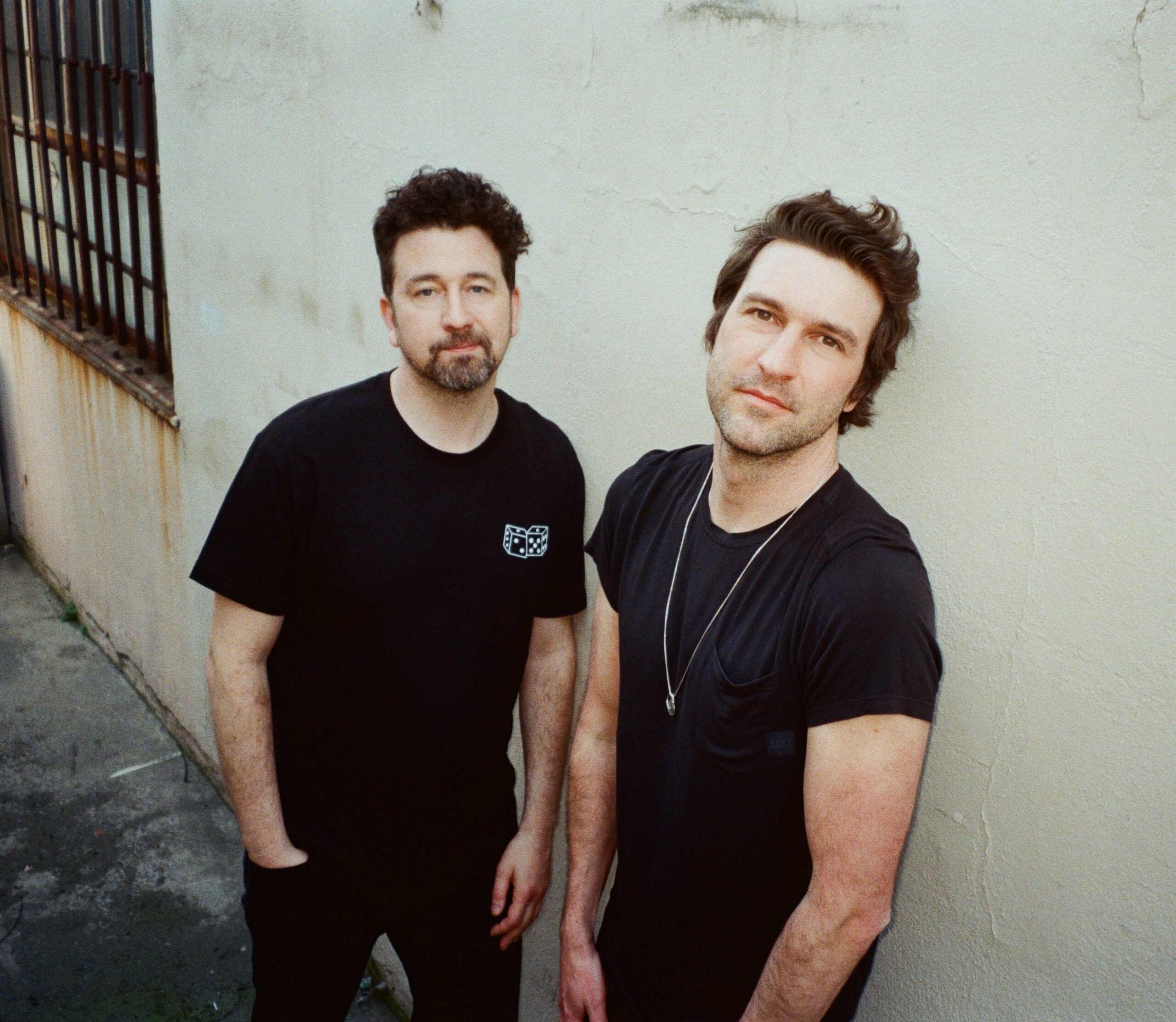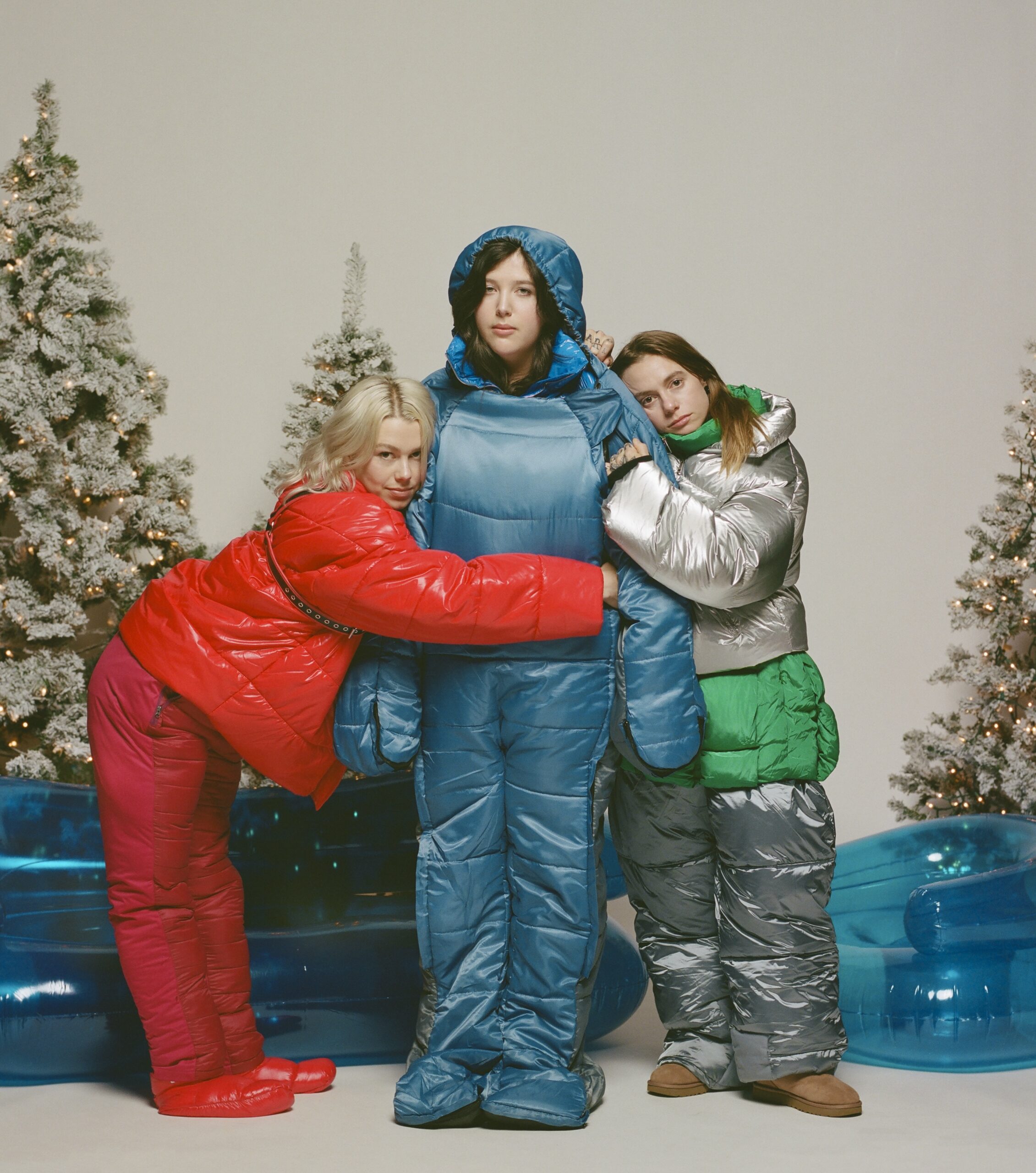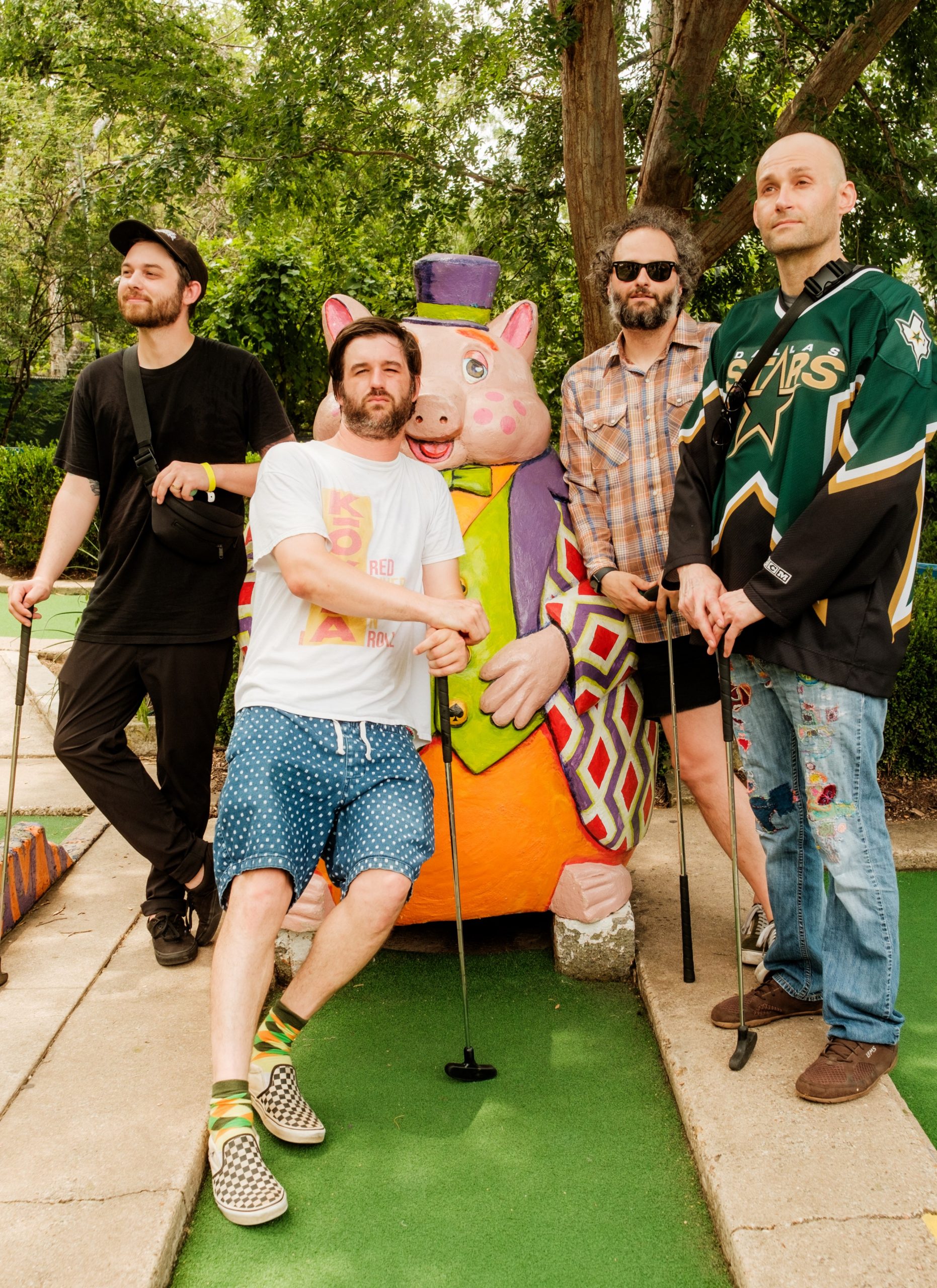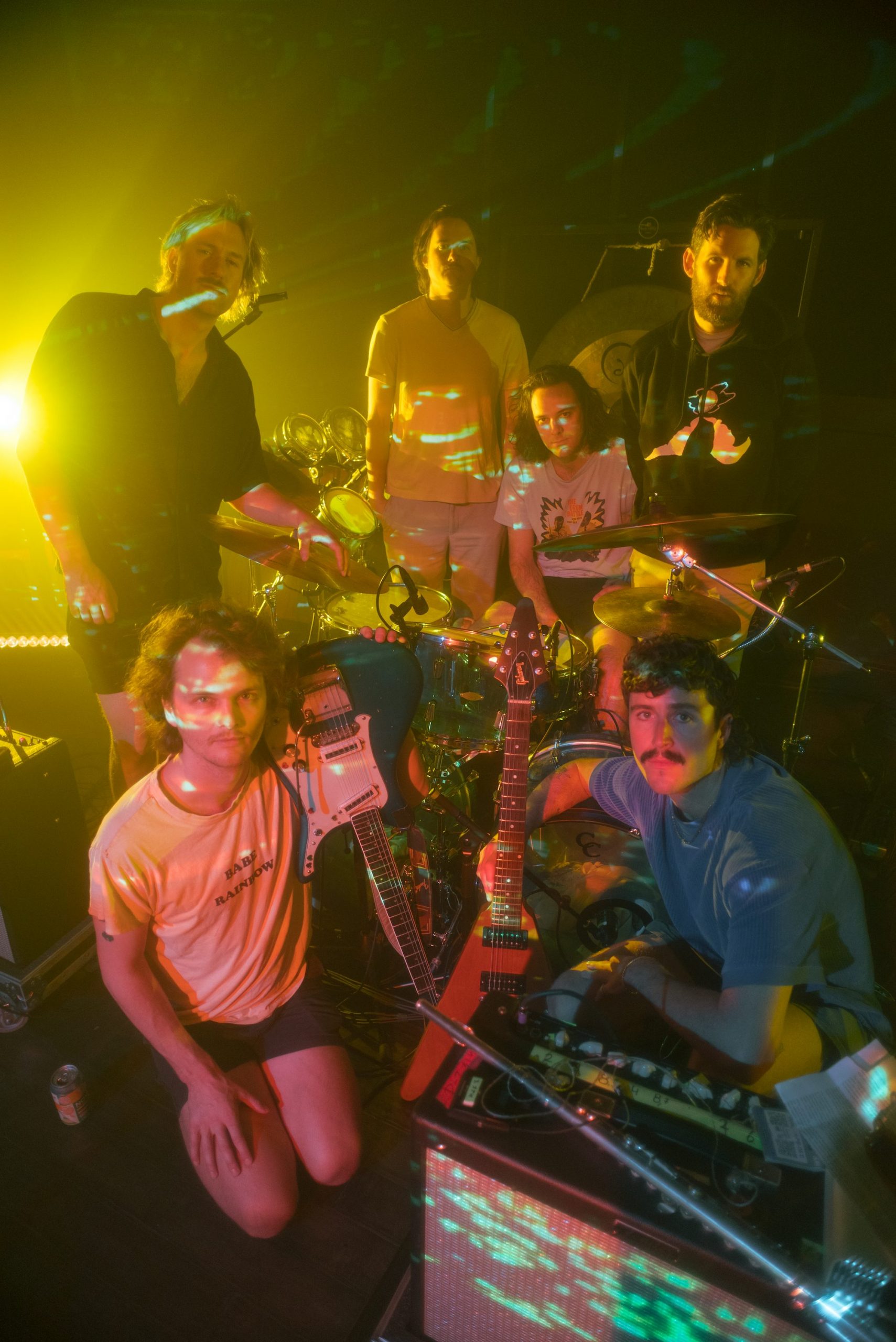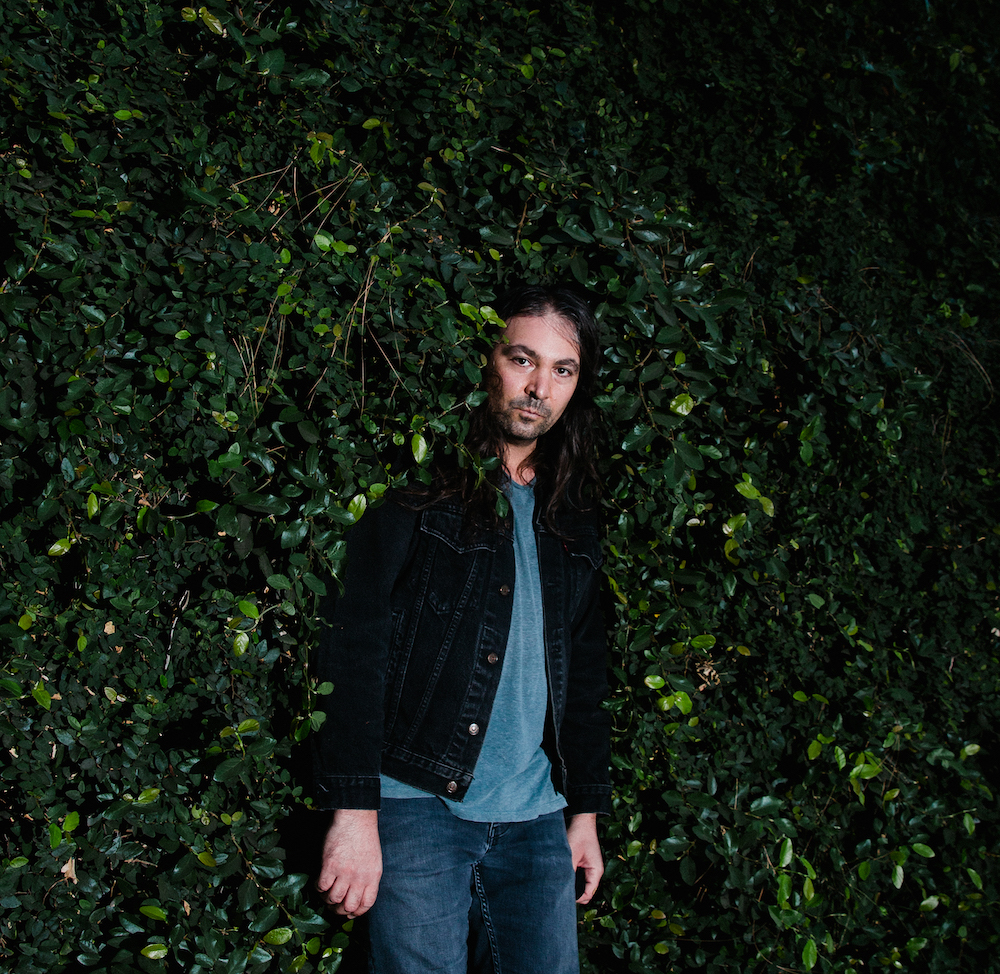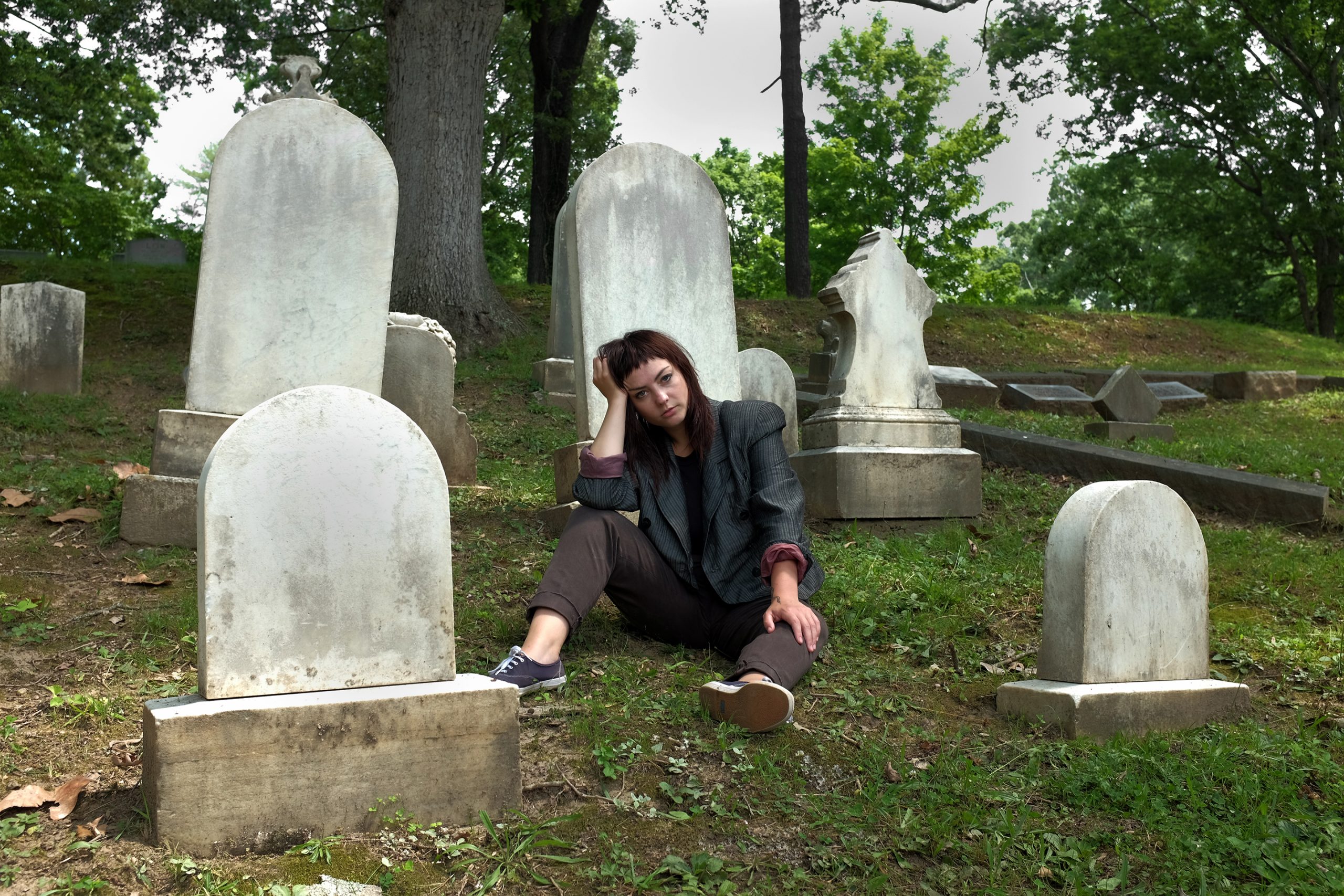The Chicago pop-rockers and surprise TikTok darlings take us deep inside the making of their new album, the vulnerable and infectious Emotional Creature
After recording all day, Beach Bunny are taking a break with a dozen warm beignets. Lili Trifilio opens a paper bag to share them with everyone in the room -- guitarist Matt Henkels, drummer Jon Alvarado, bassist Anthony Vaccaro, producer Sean O'Keefe, and me -- and a cloud of powdered sugar poofs into the air. It's a suspiciously warm spring day for Chicago, but they're happily holed up indoors to track their sophomore album, Emotional Creature, which will be released July 22 on Mom+Pop Music. While everyone bites into a pastry to fuel another six hours in the studio, O'Keefe wheels around in his chair with an excited look on his face. "I posted a story of you on Instagram and Butch Vig just messaged saying he loves Beach Bunny!" It's the fifth response O'Keefe has gotten like that today from his music industry peers, including one from Johnny Minardi, the Vice President of A&R at Elektra Records. O'Keefe seems a little taken aback, as if he knew Beach Bunny's appeal is hard to resist, but that their reach is something he hasn't seen in a while.
"Oh wow, that's cool!" Vaccaro says, and the rest of the band nods in agreement. O'Keefe pauses for a moment, one hand on the mixing board. It looks like he's unsure what the best way to drive home how huge that compliment is. "You know who he is, right? Garbage drummer? Produced Nevermind?" he continues.
"Yeah! That's really nice of him!" says Trifilio in her usual cheery voice. There's no disinterest or air of coolness clinging to these responses. It just comes across like Beach Bunny themselves don't quite know what to do with their fame. To be fair, they're situated at an interesting place: big enough to be well-liked by just about everyone, from preteens to their parents, but small enough where the fact they can even make a living off their art still comes as a shock. That's the weird part about being a DIY band that suddenly blows up.
Trifilio formed Beach Bunny as a solo project back in 2015. After wanting to give music a whirl for years but hesitating due to the intimidating nature of the industry, she finally decided to record an EP of original indie-pop songs, Animalism, from the comfort of her childhood bedroom in Chicago. Trifilio was just 18 at the time, but the fact she pulled it off by herself excited her. She set to work recording follow-up EPs in college, 2016's Pool Party and 2017's Crybaby. Eventually Trifilio scouted three musicians to join her under the moniker so she could enter a local battle of the bands, which denied entry to solo acts. They spent three months rehearsing for the contest, and their ensuing collaborative spirit convinced Trifilio to turn Beach Bunny into a proper band. The quartet sat down to record their 2018 EP Prom Queen shortly afterwards, and they became a local tour-de-force in the process, with most everyone in Chicago rooting for them. By the time Trifilio was about to graduate with a journalism degree, Beach Bunny had stepped into the studio with Joe Reinhart of Hop Along to record their excellent debut album Honeymoon, overflowing with sugary vocal hooks and alt-rock tinged guitars. Anyone who wasn't previously won over finally caved.
It helps that Beach Bunny make it easy to cheer for them. Trifilio sings candidly about personal struggles and teenage insecurities that are timelessly relatable, and her bandmates bring the revved up flair that makes otherwise simple power-pop feel so energetic and polished. Beyond the music, all four members are unpretentious kids who grew up paying their dues and expecting nothing for it. Trifilio was a cashier at her local pizza shop Armand's; Henkels worked behind the counter at Panera Bread; Alvarado flipped Whoppers as a fry cook at Burger King; and Vaccaro, who joined the band in 2019 following original bassist Aidan Cada's departure, landed jobs at Best Buy and his local record store. From day one, Beach Bunny have captured the everyday joy, misery, and awkwardness of youth -- particularly that of your average teenager -- with surprising grace. Their songs are confessional without the usual melodrama, honest without the accompanying cringe, level-headed without getting preachy.
It's easy to imagine their surprise, then, when Beach Bunny became TikTok-famous thanks to "Prom Queen," the titular EP's lead single about learning to ignore unrealistic beauty standards. Thousands of teenagers were filming themselves grappling with self-hatred, body fat, and acne to the song's simple refrain: "Maybe I should try harder/ You should lower your beauty standards." The song's music video racked up 20 million views. Beach Bunny were launched into the pages of The New Yorker and Paper Magazine, where they were lauded with praise. They landed sets at festivals like Lollapalooza and Pygmalion. A sea of fans started populating every social media account the band had, responding to each Instagram picture and tweet Trifilio posted. Someone even started a Beach Bunny subreddit and Instagram fan account to archive their every move.
Yet none of those things dominated Beach Bunny's thoughts as they rocketed to fame. Instead, Trifilio was preoccupied with the message of "Prom Queen" warping in real time and the potential effect it could have on listeners. While she's prone to sing about dark subject matters, Trifilio never intends for her songs to serve as wallowing grounds. So she immediately wrote a message and pinned it to the top of the YouTube page. "I wrote this song for every person out there that has felt insecure, unloved, or unhappy in their own skin — it is in no way meant to glamorize, encourage, or promote eating disorders, body hatred, or body shaming in any form," it reads. "You are worthy of love, you are beautiful just the way you are, and beauty is a social construct. Please don't harm your health or well being to live up to these invented expectations. It is not worth risking your life over. You are already a Prom Queen. You are already enough." Trifilio started Beach Bunny to deal with the stress of growing up, not to grab at popularity. She wanted to make sure her songs would help strangers do the same.
Two years later, Beach Bunny are still going viral on TikTok. "Prom Queen" has yet to die down on the app, but more importantly, it's being nudged out by their wildly addicting song "Cloud 9," a sentimental Honeymoon cut about falling head-over-heels in love. TikTok users are syncing the song to nostalgic complications, slideshow-style, honoring the people they love: fathers, boyfriends, parents, dogs, even seventh grade math class. It's so big that Beach Bunny just tapped Tegan And Sara for a gender-inclusive remix of the song. When I ask her about it, Trifilio is still stunned that the indie-pop duo was game to collaborate. As for the additional boost of TikTok fame, she's grateful but otherwise unfazed. "Yeah, ultimately I'm cool with it," laughs Trifilio. "'Prom Queen' has an important message and I'm glad people are getting help and figuring out their relationship with themselves. I was not in a happy relationship by any means when I wrote 'Cloud 9,' so it's lovely to see people reclaim that song too and apply it to these positive experiences."
"It's been strange seeing the effect at shows more than anything," Henkels says. "I remember playing this festival in the DC area. The kids up front didn't know who we were because they were there to see another artist later that day. We closed with ‘Cloud 9' and they still didn't know it until right when the chorus hit. I specifically remember looking at these kids and seeing them turn to each other, gasp mouths open, and have that light-up moment like, ‘Oh my god! It's this song!'"
Seven years into being Beach Bunny, the excitement doesn't lay in the upcoming reception to their music or future opportunities in glossy magazines, but rather the ability to bring these songs to life. Clearly, Trifilio is still enthused to be making original songs at all — a pipe dream she believed was reserved for Berklee prodigies and kids with money to burn. In the studio, she practices take after take of her vocal parts for "Gone" before recording it, trying to walk the line between sing-shouting with urgency and delivering a verse that's scratchy. Each take is accurate, and the difference between them is minimal to the average ear, but Trifilio is striving for her own type of perfection. The balance of softer, low-note enunciation to powerful, end-of-sentence vocal punch is the key to her sing-shouting delivery. When Trifilio realizes she forgot a sentence in the song's bridge, she asks for five minutes, takes out her pencil, and scribbles a new lyric into her notebook, unperturbed. She gives O'Keefe a thumbs up and he starts recording. During the chorus, Trifilio reaches for arguably her highest notes yet in Beach Bunny history — "Do I fall into your arms again/ After all, is this the end?" — and finally nails it. A huge grin spreads across her face and she dances inside the vocal booth to celebrate. The singing lessons Trifilio signed up for during the pandemic clearly paid off, as her voice sounds more confident and stronger than ever before.
While recording their parts in the studio, the rest of Beach Bunny are similarly focused and determined. When not recording, they're incredibly laid back. It helps that it's April 2021, which means we all recently received the first dose of the vaccine and are feeling optimistic for the first time in the pandemic. Hanging out with anyone in person, especially your friends, feels like magic. The studio's front room is covered in Topo Chico bottles and various ways to kill time — a Frank Zappa memoir, Animal Crossing: New Horizons, a laptop screening anime shows, a bag filled with double-stuffed Oreos and Skittles — but everyone prefers to hang out in the mixing room together, where they crack jokes and stroll down memory lane. Henkels challenges O'Keefe to a game of Hearts before realizing he's outskilled, so instead O'Keefe teaches him how to count against bots on an online version of the game. Alvarado tells a story about how his high school band only played one show, a graduation party, where they covered bands like Never Shout Never and Taking Back Sunday. "Everyone laughed at us and I was so bummed out I literally never played music again until joining this band," he says. Vaccaro explains the origin story of his social media handle @pavementthebandofficial, which started as a joke in hopes of being paid off in exchange for the handle but concluded unceremoniously with Pavement opting for @pavementband instead. Alvarado breaks into spontaneous imitations throughout the day: a prim-and-proper British take on a freestyle, a Beastie Boys-style scream intro a la "Sabotage" to one of their own songs, Billy Corgan's nasally rendition of "Tonight, Tonight." Every hour is filled with laughter, and O'Keefe lovingly calls the band his peanut gallery as a result.
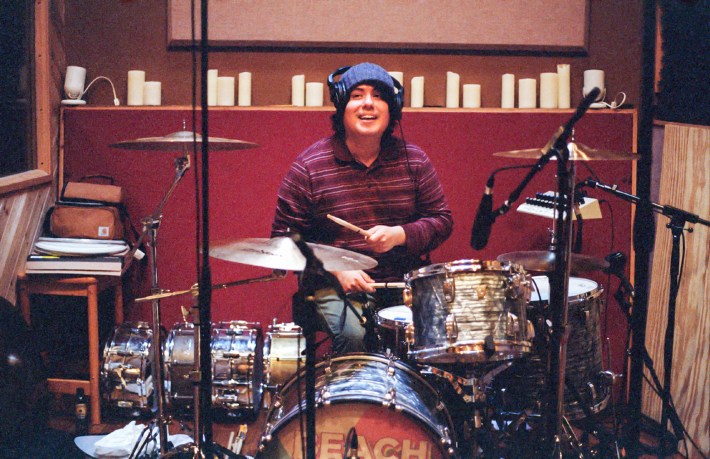


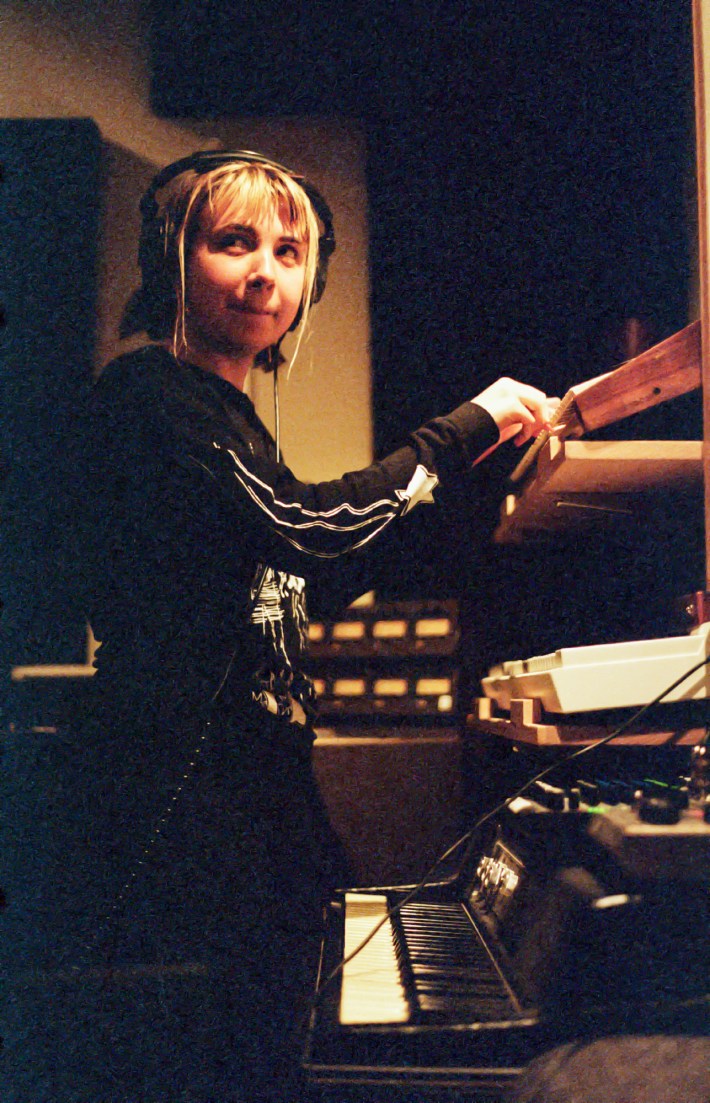
The bond between O'Keefe and the band is effortless and healthy, and it's clearly impacted the sound of Emotional Creature for the better. The way Trifilio describes it, she's never felt more respected as a songwriter. That's what grabbed Beach Bunny the first time they met O'Keefe. Before selecting him to produce Emotional Creature in full, they met up to record "Weeds" as a standalone single and were immediately taken with his affable personality and steadfast belief in Trifilio's vision. "A lot of times in the music industry, there can be a lot of big, toxic, guy egos. Sean doesn't have that. Usually I feel guilty making creative decisions in a lot of these scenarios, but he actually encouraged it and never made me feel bad in any way," Trifilio says. "Sean is extremely patient. I specifically remember when we were mixing the record, I went over there and I think he thought it would take two hours. It took six hours because I was nitpicking things, but he didn't complain once. In fact, he said I could come back later if I ever wanted to. Most people would be so annoyed by that."
"I think we all agree Sean is too nice. Not in that he needs to be meaner, but that I don't think I've ever met someone as genuinely nice as Sean in my life," Henkels adds. "When we were on tour, I texted him a question I had about mixing. He was mid-movie with his girlfriend and he paused the movie so we could talk on the phone for 45 minutes. I told him he could get back to watching it, but he was adamant and it helped me so much."
O'Keefe's professionalism and down-to-earth personality is a reflection of his resume. His first claim to fame was Fall Out Boy's breakout 2003 album Take This To Your Grave, and he quickly followed up with work for Motion City Soundtrack, Hawthorne Heights, and Less Than Jake. O'Keefe's a quintessential Midwestern guy, all good manners, unshakeable modesty, and genuine friendliness. Behind the board, he has a natural touch that brings out the melodic side of rock and punk, and it's obvious what a natural fit he is with Beach Bunny. Each time the band settles on a few bass or guitar to add to a song, O'Keefe plays back the recording and mixes it in real time, balancing the levels to draw out the crispness of each instrument without making Beach Bunny sound too glossy.
That doesn't stop Beach Bunny from lovingly teasing the producer about Fall Out Boy every day, though. Vaccaro keeps asking O'Keefe for sweatshirts from Clandestine, Pete Wentz's clothing line, and reveals he's been texting the producer voice memos of himself singing "Grand Theft Autumn" and "Dead On Arrival" late at night. "You'll never be Pete Wentz, Tony. You're too tall! Plus you haven't spun your bass around nearly enough," says O'Keefe with a laugh. Months later, however, O'Keefe reveals in private that the respect is mutual. "I did share some of the new songs with Patrick Stump from Fall Out Boy. He told me he was already a fan and loved the new stuff I played him."
https://youtube.com/watch?v=iTRIrUMLsA8
Emotional Creature marks the first time Beach Bunny have used synths in their songs. Often when indie rock bands do so, it results in full-blown synthpop and harsh pivots that don't fit the group. Beach Bunny tread carefully on the album, and it works surprisingly well. There's a gentle keyboard hum in the background of the otherwise acoustic number "Infinity Room" and a stacked wall of synths on the instrumental track "Gravity," which serves as a segue of sorts between the first and second half of the album. It's tasteful, complementary, and speaks to Beach Bunny's strong sense of musical identity. "I can't remember a single moment where they wanted to chase the sound of another artist," O'Keefe says. "Beach Bunny stick to what interests them and look past any current trends or outside influences the entire time."
The most prominent use of synths on Emotional Creature is also the coolest. Beach Bunny knew they wanted "Scream" to be the most experimental of them all, but they didn't know exactly how to pull it off — just that they wanted to use a lot of synths. After laying down the rhythm section and tracking her vocals, Trifilio gets to work toying with the different synths laying around O'Keefe's studio, relying on one for elongated notes in the background and others for more staccato notes in the forefront. It's not until she exhausts her options that the final puzzle piece falls into place. While Trifilio uses a synth plugin that sounds like sonar, Alvarado is reminded of an article he read about the world's loneliest whale, a creature whose one-of-a-kind call is in 52 hertz — a frequency higher than that of other whales, which suggests it's going unheard by other whales. Alvarado plays the audio of the whale's sound from his laptop; sure enough, it's mellow, warbling, and eerie enough to sound like a more textured version of the synth plugin Trifilio was just using. They begin working the whale call into the intro for "Scream" and joke about getting sued, until Alvarado discovers that the audio is in the public domain. Everyone cheers. When O'Keefe goes along with it, no questions asked, and admits he's never used a whale recording in a song he's produced before, Beach Bunny lose it. "Move over, Pete Wentz!" Alvarado yells.
The thing about Beach Bunny's music is that it gets stuck in your head instantly. After leaving the studio, I find myself belting the chorus of "Gone" for the next two weeks straight. Several times later that summer, I am going about my day when the impulse to hum the refrain to "Deadweight" takes over. At this point it's been months since I've last heard those songs in a semi-real form in the studio, but my brain can't let go of them or the instant dopamine they prompted. Beach Bunny specialize in earworms with something to say. They know how to sink a hook in, and it's impossible to withstand it. Across the band's dedicated subreddit and Discord server, fans desperately seek audio of "Entropy" after hearing it on tour because they can't get it out of their heads and pine for "Karaoke" to drop after catching Lili's acoustic rendition on an Instagram livestream a year earlier.
So by the time an unmastered copy of Emotional Creature lands in my inbox in the fall, I scramble to finally get these songs out of my head. In reality, my brain just swaps them for new songs I can't shake. The rest of the album is, unsurprisingly, just as gripping as the songs I sat in on during recording sessions. Album opener "Entropy," an ode to revealing your inner self in a relationship, rides blissful vocal harmonies that radiate warmth. My gut says it's a Hilary Duff single without the Disney-approved lyrics. This isn't far off; Trifilio namedrops the Jonas Brothers as an inspiration. When she sings, "Somebody's gonna figure me out/ It's what I am, it's what I was, it's what I wanna become," I can picture how my younger self would've listened to this on the school bus for a confidence boost, the soaring guitar solo acting as an invisible sword to fend off petty judgements. Lead single "Oxygen" similarly rides the high of falling in love thanks to rhythm section rushes and charging guitar strums. Although comparatively breezier in sound, "Deadweight" follows a feel-good melody that's reminiscent of Built To Spill's "Liar." And then there's the five-minute-long closer "Love Song." It's the longest track Beach Bunny have ever recorded and it acts like an epilogue of sorts. During the final third of the song, the band reprises guitar melodies from previous songs, Trifilio sings selected lyrics from across the album, and there's an unexpected key change. It's easy to understand why Vaccaro informally dubbed it "Abbey Road Destroyer."
"I remember [seeing kids] have that light-up moment like, ‘Oh my god! It’s this song!'”
Matt Henkels
Nina Corcoran/Stereogum
Shortly after I hear the album for the first time, we hop on a Zoom call from our respective homes. It's December 2021 and, once again, so much has changed. While everyone was riding high on the optimism of the first vaccine, the band experienced a flicker of what life was like pre-pandemic: Beach Bunny played Riot Fest, Trifilio and I bumped into each other at a street festival in Chicago, and the band even collaborated with one of Trifilio's biggest music icons, Marina Diamandis, on a remix. Currently, though, Omicron is tearing through New York City and everyone's hoping the booster shot helps ward it off. Beach Bunny feel lucky to have wrapped up their longest tour to date — a seven-week trek across North America — without catching COVID, but the fact their album release is being pushed back again feels exhausting.
Trifilio's whole career has been defined by her vulnerability and the comfort with which she opens up. This time around, though, it's a welcome treat to hear her sing about growth and healthy boundaries, as opposed to the toxic guys she couldn't quite outrun on Honeymoon and Beach Bunny's 2021 EP Blame Game. The days of counting calories and pining for blue eyes are replaced with championing undereye circles and embracing hereditary qualities. Trifilio narrates this change of heart in "Weeds," a self-empowerment anthem about standing up for yourself in the wake of a failed relationship. "‘Cause he's not the problem/ The problem is you think you're only viable for love when someone makes you feel complete," she sings. "You can't blossom if you keep growing gardens out of weeds." It sounds like a lost Hop Along song from their emo era and acts as the centerpiece of Emotional Creature. "I think I've always viewed myself as an emotional person, what with the name of the Crybaby EP and all, but this is a more mature version of that," explains Trifilio. "It's me embracing it. We're all emotional people. But it doesn't carry a negative connotation with it anymore, to me. It is what it is. I'm emotional."
Listen to any Beach Bunny record and it's obvious Trifilio has an innate knack for melody and lyrics, but the extent to which she's grown over the past two years also highlights how much more she has to offer that she hasn't revealed yet. "Lili is a decisive, creative person and one of the best songwriters I've worked with," says O'Keefe. "She knows exactly what she wants. If something is not right, we keep searching till we find it. And when it's found she moves on without second guessing. That's something you don't see very often. And then on top of all of that, she has an extraordinary voice. It's a hard combo to beat. I know that Lili writes songs about topics that are personal and meaningful to her. When you're in her position, there can be a lot of pressure to steer your writing in other directions to satisfy outside people, and I never once saw her entertain those ideas. As a music fan, those are the types of songs I want to hear."
Trifilio's vision is so clear that she even has a full-blown sci-fi aesthetic plotted for the album rollout. She's been indulging in everything from older classics like Star Trek and Barberella to newer staples like Dr. Who and Watchmen. (Note the Dr. Manhattan lookalike sweeping Trifilio through space on the "Oxygen" single art.) In the studio, she's busy jotting down ideas and drawing possible renderings for artwork, merch, and music videos. "I'm training to become the first jedi to write pop bangers," she later jokes on Instagram. For Trifilio, visuals aren't a way to explain her lyrics or sell the music. Instead, she's taking after some of her biggest pop idols -- Marina And The Diamonds, Charli XCX, Grimes -- by prioritizing visuals as an exercise in fun. "None of these songs are about outer space or aliens or anything. It's just fun to have an excuse to explore a new style because you're changing along with the music you're writing and so are your interests beyond music," she says. "There's definitely a degree of escapism there, especially compared to Honeymoon, which was based in reality."
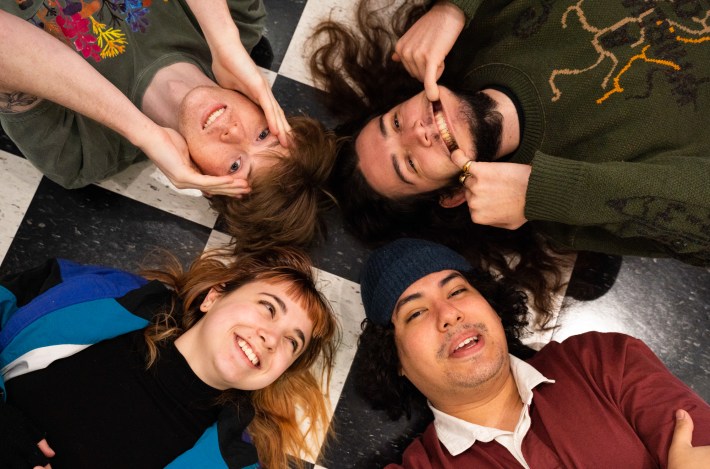
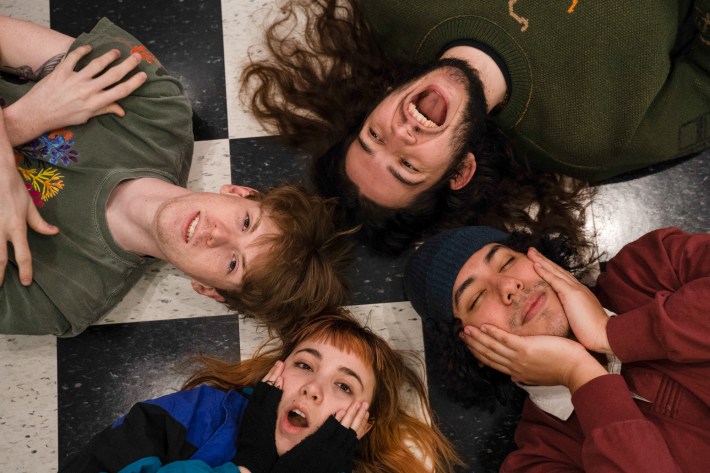
The final time we meet up, nearly a year to date since we met at the studio, it almost feels like déjà vu. There's a sense of tepid excitement at the thought of COVID starting to wane; spring is in the air even though it shouldn't be; and Beach Bunny are plotting their next moves for their upcoming 2022 tour. We're sitting in New Wave Coffee, admiring the corgi that can't quite hurdle the step up into the cafe, reflecting on how long it's been. So much time has passed, in fact, that everyone has celebrated a birthday; Trifilio is now 25, Henkels is 24, Alvarado is 25, and Vaccaro is 26. When we start talking about Emotional Creature's impending announcement, there's a shared sense of disbelief that they can finally talk about the album soon and share the music with their friends.
"I come from a family of musicians, and that means the bar is constantly being raised," Vaccaro says. "I think this album will be the first time in a long time where they can pat me on the back and be proud of their son as a musician."
"Everything that's happened [this past year] is crazy amazing, like tours and those remixes, but I honestly get the most satisfaction out of seeing what we can do together. Getting to be creative with your friends is the best part," Alvarado says.
"Exactly," Trifilio says. "After so many years, you get better at your instruments, and with that confidence comes more risk-taking in the studio. I think it's been a very natural creative evolution for us. When I bring songs to the band, it's the same way that it's been since 2015. When we go into the studio, that magic is still there. Actually, it's evolved, because it feels even better now. With this album, being more grown up and having a bond with the label, I feel like we finally knew what we were doing from beginning to end. The imaginative side finally can transition into reality, no problem."
After talking about how much the band has grown, both as musicians and as people, the topic of learned experiences come up. Henkels realizes he's not only become more proficient at creating beats but has gained the confidence that accompanies feeling comfortable with your abilities. Vaccaro is happy he's formed so many healthy habits that make a concrete difference, like giving up smoking and maintaining his sobriety. Alvarado is grateful he tried to be productive, even if that meant just getting one simple task done in a day. As for Trifilio, she's proud ofestablishing personal boundaries and that the band can live off their music career full time now. For a long time, she didn't think it was even possible. She considers poking fun at herself for being so cheesy, but decides against it. Instead, she doubles down on the earnestness — a signature trait of hers and the secret ingredient that makes Beach Bunny's power-pop charm so effective.
With the performative enthusiasm of a cheerleader, Trifilio exclaims, "Follow your dreams!" She laughs to herself and shakes off the semi-mocking tone. "No, but seriously, I know how that sounds. As a young kid I was watching Hannah Montana thinking that was the most unrealistic expectation of all time. But now here I am and all of it happened organically; it just goes very slowly over many, many years. If you want to do something in a creative field, make it a passion project and try it for a few years. You'll learn what you want to do, or you'll get to go on a journey. Embark on your journeys! Don't settle! I mean it! Oh, and don't date toxic boys. Or I guess, if you do, at least you'll have songs to write about them."
